Building an ecommerce app on a whim is like proposing to someone on a first date:
Likely to provoke salty eyerolls from your date and unlikely to work out in the long run.
This guide is all about telling you how to start selling online the right way, to eventually arrive at the ecommerce version of wedded bliss. We’re going to run you through:
- All the business basics you need to cover before you start building an ecommerce app
- The best ecommerce app builders on the market right now
- How to create your ecommerce app
Tuck your ankles and elbows in and take the plunge 👇
Why build an ecommerce app?
In 2023, the ecommerce industry was worth over $5.8 trillion USD, and forecasts predict that it will grow to over $7.9 trillion USD by the end of 2027. More than $3.59 trillion USD is made from ecommerce apps alone.
So it’s clear that the ecommerce app market is growing and creating an ecommerce app could prove well worth your time – at least financially.
When your app is on one of the app stores, be it the Google Play Store or the Apple App Store, you have the potential to reach millions of users.
There are more than a billion iPhone users worldwide, all of whom have access to the app store and the potential to download any number of the 1.6 million mobile apps that are currently live. In comparison, there are 2.5 billion Android users and over 3.55 million mobile apps on the Play Store available to download.
This means, in theory, if you were to release an app onto both Apple and Android app stores, you’d have a potential market of 3.5 billion customers. There’s no reason why you can’t be the creator of the next Shein – as long as you build a great ecommerce app.
4 crucial steps to take BEFORE you think about starting an ecommerce app
Creating an ecommerce mobile app that grows your business over time takes preparation. Here are the basics that act as your personal assets to nail before going any further:
1 - Come up with a business idea

Various types of businesses have high-profit margins. And they all begin with a great business idea! For example, you could:
- Be passionate about solving a particular problem
- Think you’ve identified a gap in a market where you have expertise
- Want to invest in a niche you think has growth potential
Or something completely different. But whatever it is, the sweet spot is typically found between something you’re emotionally invested in AND also have prior knowledge of.
For inspiration, check out our comprehensive list of80+ ecommerce business ideas 👈
How to choose a name for your ecommerce app
When brainstorming your app name, get creative and jot down everything that comes to mind.
And if you’re in need of inspiration, you can use domain name registrars like NameMesh.com, Naminum.com, VisualThesaurus.com and even ChatGPT.
When deciding which of your ideas to take forward, opt for names that are easy to pronounce and spell for your target audience's convenience. You should also check for existing businesses with a similar name and add relevant keywords if possible.
Then open it up to feedback from business partners, friends and family.
Once you’ve decided on the right option, you can then use it to inform your business logo as well as your brand’s wider visual identity.
How to create a logo
When developing your logo, try to avoid cliché ideas like swooshes, gears, lightbulbs or globes, instead opting for fresh and distinctive concepts.
Choosing vector images for your logo, created in a graphic design service like Adobe Illustrator, will allow you to avoid pixelation issues associated with raster images like .jpg, .gif, .bmp and .psd files, which tend to have larger file sizes and slower loading times.
Lastly, ensure your logo works in black and white, as you may need a monochrome version for receipts, packaging or cost-effective printing.
2 - Analyse market trends
Once you have your winning ecommerce business idea, your next job is to flesh it out. And one of the best ways to do this is to analyse current market trends.
By keeping your finger on the pulse of what's happening in your niche, you can get ahead of your competitors by offering things they don’t.
Here’s exactly how you can do that:
Identify growth areas
For example, you could consider the increasing demand for eco-friendly and inclusivity-focused products, health and wellness items or tech gadgets.
Study consumer behaviour
Understand what consumers are buying and why. Conduct surveys, read market research reports and analyse consumer reviews to gain insights into their preferences and pain points.
Follow industry news
Stay updated on industry news and developments. Subscribe to relevant trade publications, blogs and newsletters to stay informed about emerging trends and innovations.
Identify gaps in the market
Pay attention to areas where existing ecommerce businesses may be falling short in meeting customer needs. Is there an opportunity to provide a better solution or a unique twist on an existing product or service?
3 - Solve consumer problems
Successful businesses address real problems or challenges that consumers face. By identifying these pain points, you can further develop your ecommerce business idea to ensure that you achieve product-market fit. Here’s how:
Conduct surveys and interviews
Reach out to potential customers and ask them about their daily challenges. What frustrations do they encounter that could be alleviated with a product or service?
Research online forums and communities
Explore online forums, social media platforms and community groups related to your areas of interest. Pay attention to the questions and problems people discuss.
Identify unmet needs
Look for gaps in the market where existing solutions may be inadequate or non-existent. Can you create a product or service that fills these gaps effectively?
4 - Research your competitors
Although you’ll already have a good idea about what the market has to offer by now, performing a detailed app competitive analysis allows you to put the finishing touches to your idea before you commit to building it. Here are some top tips on how to do it effectively:
Review your competitors' products
To start, keep your customers and direct competitors in sharp focus. As Robert Hoffman, Marketing Manager at cashback comparison site, CashbackHero, advises, you should “examine [your] competitors' products and services, as well as the features and benefits they deliver”.
Using these insights, CashbackHero discovered that their “competitors weren’t offering certain types of cashback rewards” meaning they could differentiate themselves by providing them. The company also offered faster delivery times than what already existed on the market.
Scrutinise their pricing strategy
In the ecommerce world, understanding your competitors' pricing strategy is paramount. It lets you identify areas to compete in and differentiate. For instance, Cashback Hero uncovered opportunities to offer unmatched discounts on specific products.
Assess customer experiences
Analysing the end-to-end customer experience – from customer service and delivery speed to app design choices and all forms of navigation – is another way you can steal a march on competitors. By identifying gaps in competitors’ offerings, for example, Cashback Hero managed to launch with high customer satisfaction levels.
Analyse their digital footprint
Truly understanding your competitors involves dissecting their digital strategies, just as Max Benz, Founder and CEO of financial product comparison site, BankingGeek, did.
“We gathered data about our competitors’ digital engagement strategies—for example, the advertising channels they used—as well as their total follower count and subscribers list,” he says.
“Meanwhile, we also compared the content on their social media channels with ours.
“Our next step was to track key app metrics such as conversion rates and daily average users (DAU). This allowed us to benchmark our marketing performance relative to others in the industry.”
This depth of analysis enables informed decisions on app development and marketing campaigns.
Continuous monitoring is key
Securing your market position isn't a one-time endeavour. Regularly update your competitive analysis.
Tom Golubovich, Head of Marketing at Ninja Transfers, an ecommerce shop selling custom vinyl transfers, suggests setting up a review schedule to evolve and adapt your analysis as the market changes.
“During each session, insights and information can be updated, new strategies can be implemented and past strategies can be evaluated for their effectiveness,” he notes.
By following these steps and continuously monitoring your competitors, you can create a bulletproof app business plan.
Learn more in our dedicated blog on ecommerce competitive analysis 👈
How to choose an ecommerce app builder
Now you know why it’s important to create an ecommerce app and what you need to do before building it, let’s dive into how you can select the best ecommerce app builder for your business.
The first stage is finding your ideal match. Here’s how 👇
1 - Understand your business needs
Before diving into the options available, it's crucial to have a clear understanding of your business needs and goals.
Determine your digital product offerings and define your target audience's preferences and behaviours for effective feature and design decisions. Consider these 3 questions once you have:
- Scale and growth - are you starting small and aiming for gradual growth or do you have ambitious plans for rapid expansion?
- Budget- consider a range of costs, from initial setup to ongoing expenses.
- Technical expertise - do you or your team have the technical skills to manage and customise the platform or do you need a user-friendly solution?
Hit the link for a comprehensive breakdown of ecommerce mobile app development costs 👈
2 - Evaluate key features to add
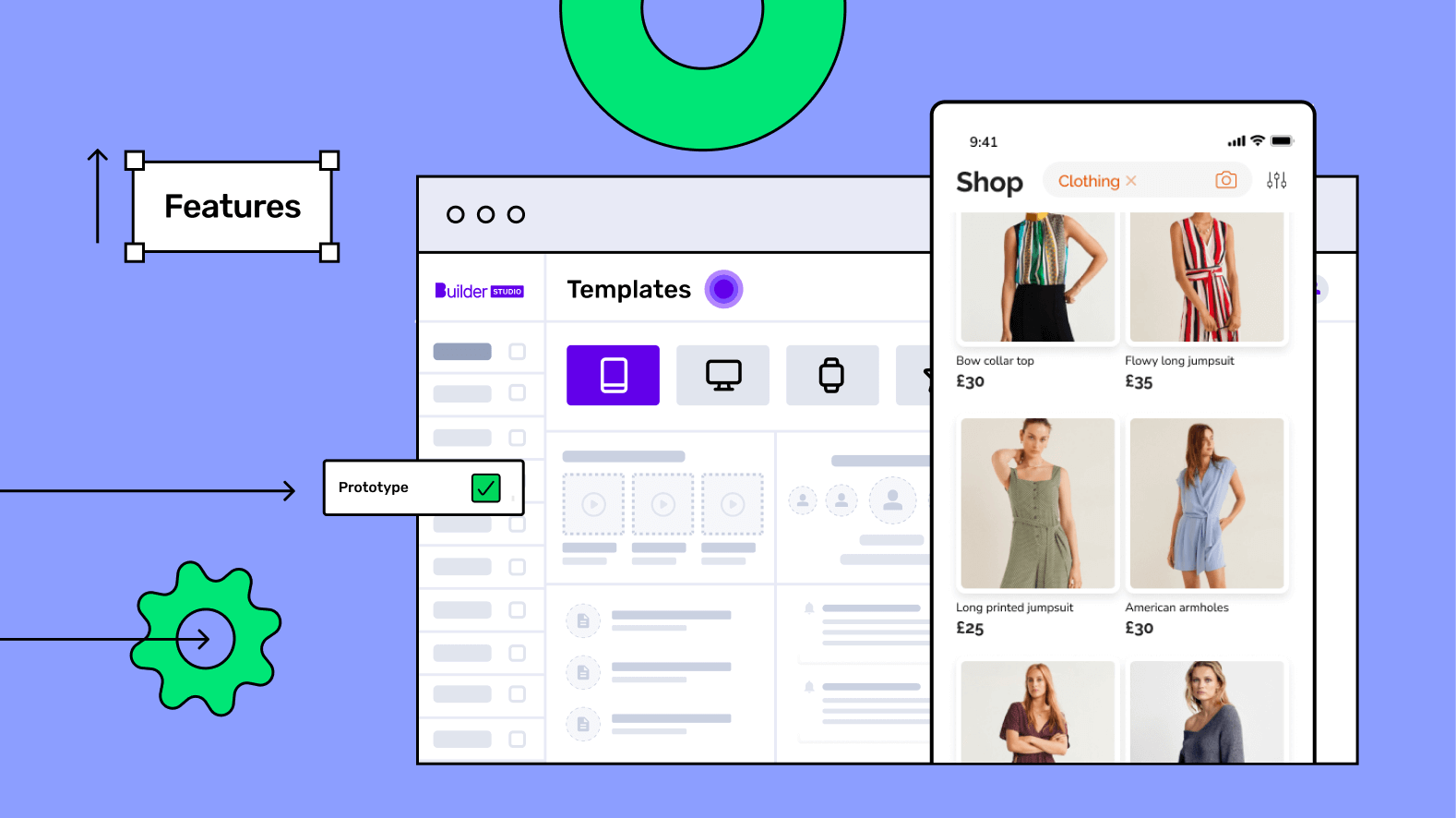
Different platforms offer varying sets of features that determine your ecommerce mobile app conversion rates. Some essential ecommerce app features you should be looking to include are:
- User-friendly navigation - a user-friendly interface is crucial, especially if you're not a tech expert. Look for platforms that offer intuitive dashboards and straightforward navigation menus.
- Personalisation - consider the extent of customisation you need. Some platforms allow choosing the perfect theme settings and extensive design and feature customisation, while others offer pre-designed templates.
- Multiple payment options - ensure the platform supports a wide range of secure payments methods, including credit cards, digital wallets and bank transfers.
- Search and filter options - search & filter bars allow customers to select what they want and add filters like price, colour, size, delivery and more to narrow down their choices.
- Product catalogue - incorporate a scrollable carousel on your ecommerce mobile app to provide customers detailed product images and videos for confident purchasing.
- Push notifications - engage customers throughout their shopping journey and drive return visits by offering discounts, promotions and product updates using push notifications.
- User review and ratings - positive reviews and ratings and clear product images serve as vital social proof for customers lacking physical product interaction.
- Delivery options and order tracking - ecommerce apps need logistics integrations that provide multiple delivery options with order tracking.
- Social media integration - integrate your social media with your app to boost awareness, engage with prospects and sell through social media posts.
- Analytics dashboard - offer a comprehensive overview of your ecommerce sales and operations for better understanding of your customer.
For a deeper dive, check out our blog on15 essential ecommerce app features👈
3 - Compare ecommerce app builders

Once you understand which features fulfil the needs of your ecommerce app, you need to explore the platforms that provide them. Above, you can see the top-level pricing details of top app builders on the market, their Trustpilot ratings and the skill level required to use them. Below, we go into a little more detail:
Platform | Trustpilot rating | Pricing | Technical skills required |
Builder.ai | From $200/month | No | |
AppMachine | $63-$159/month | No | |
BuildFire | $100-$499/month | No | |
Bubble.io | $29-$349/month | Yes | |
Google AppSheet | N/A | From $5 | Yes |
Adalo | $0-$200/month | Yes | |
Honeycode | N/A | $0-29.99/month | Yes |
1 - Builder.ai for an all-in-one solution
Builder.ai empowers you to create ecommerce apps by offering a fully managed service, meaning there's zero learning curve and no drag-and-drop dread. You can also build sophisticated, custom functionality withBuilder.ai, in comparison to the rigid templates used by some no-code app builders.
So how does this happen?
All you need to do is share your app idea and Builder.ai provides you with a pre-packaged app or build a custom ecommerce app to fit your needs, allowing you to start selling online in as little as two weeks.
You manage your online store from your own personalised dashboard, accessing sales data and customer insights to help you maximise your revenue.
You can also personalise your app with your branding and select a perfect storefront theme while seamlessly adding product inventory. The platform doesn’t charge transaction fees and there’s no vendor lock-in.
Although there's no free option, Builder.ai boasts a 3.8 Trustpilot rating and offers extensive customisation options as well as two years of free aftercare, making it an excellent choice for entrepreneurs looking to establish their online presence quickly and easily.
2 - AppMachine for beginners
AppMachine is a cloud-based mobile app builder. AppMachine is beginner-friendly with its smooth navigation and intuitive user interface (UI), making it easy to use if you don’t have extensive technical skills to create apps.
What's more, you can simply connect your data from Excel or Google Sheets with the platform and it can turn your data into app screens.
AppMachine is more suited for creating mobile web apps from the website, and on the platform, you might face limitations in terms of customisation and functionality for ecommerce apps.
For instance, if you want a unique feature with specific functionality, AppMachine’s pre-built feature blocks may not be able to meet your requirements, while its range of integrations could be too narrow for those looking for scalability of their ecommerce business.
3 - BuildFire for an social media integration
BuildFire is a popular no-code app builder that allows you to create apps for Android and iOS.
It offers a wide variety of template options that help you build functional as well as aesthetically pleasing apps.
The platform offers seamless social media integration through plugins where you can connect your app with third-party platforms like YouTube or Vimeo to share your existing content.
The BuildFire platform is on the morepremium side and offers four pricing plans. The plan starts from $100/month and goes up to $499/month. The $100/month plan is fairly basic and doesn’t offer advanced features like in-app purchases, app access codes and app analytics. More robust functionality is available, starting from $349/month plan.
4 - Bubble.io for complex functionalities
Bubble.io is a flexible no-code app builder that allows you to make responsive, functional apps.
The platform uses its own visualprogramming language that can be used for creating full-fledged multi-user apps.
This said, the platform has asteep learning curve, especially if you want to add advanced features. You might find the platform overwhelming, which could leave you scrambling for training material and tutorials.
The platform also has vendor lock-in, which makes it challenging to migrate your app to another vendor if it no longer meets your needs. And while you don't need coding skills to use the platform, you will need tospend some time upskilling so you can build an app that meets your requirements.
5 - Adalo for affordability
Adalo is a drag-and-drop no-code app builder with asteeper learning curve.
You can create well-designed mobile apps relatively quickly if you know what you're doing and have familiarity with the platform. This is because the platform requires a database for external sources andAPI knowledge on your part.
When it comes to functionality, Adalo is a powerful platform and offers hundreds of pre-built templates.
Adalo offers some of themost affordable packages in the industry, with a free package for anyone who wants to start on the platform and a $200/month plan for enterprises. What's more, is that the platform keeps the app ownership with you and doesn't claim anything.
For a full breakdown, check out our detailed guide on the best no-code app builders 👈
Step-by-step guide to creating an ecommerce app
Everything you've done up to this point has been laying the groundwork for your ecommerce app. Now, it’s finally time to start building one! Below, we’ll show you how the setup process looks with Builder.ai:
1 - Setting up store and emails
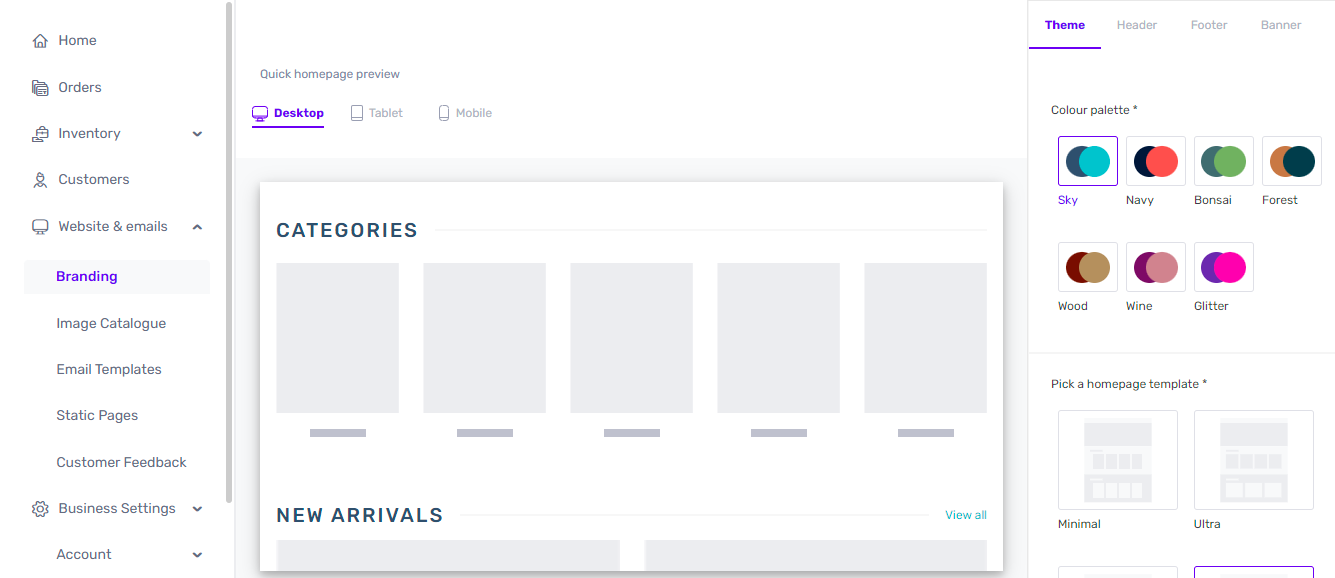
In the process of setting up your ecommerce app, the branding phase plays a pivotal role in creating an appealing and user-friendly online presence.
This section allows you to add your logo, select a colour palette that aligns with your brand's identity and choose from available templates that can be customised in real-time.
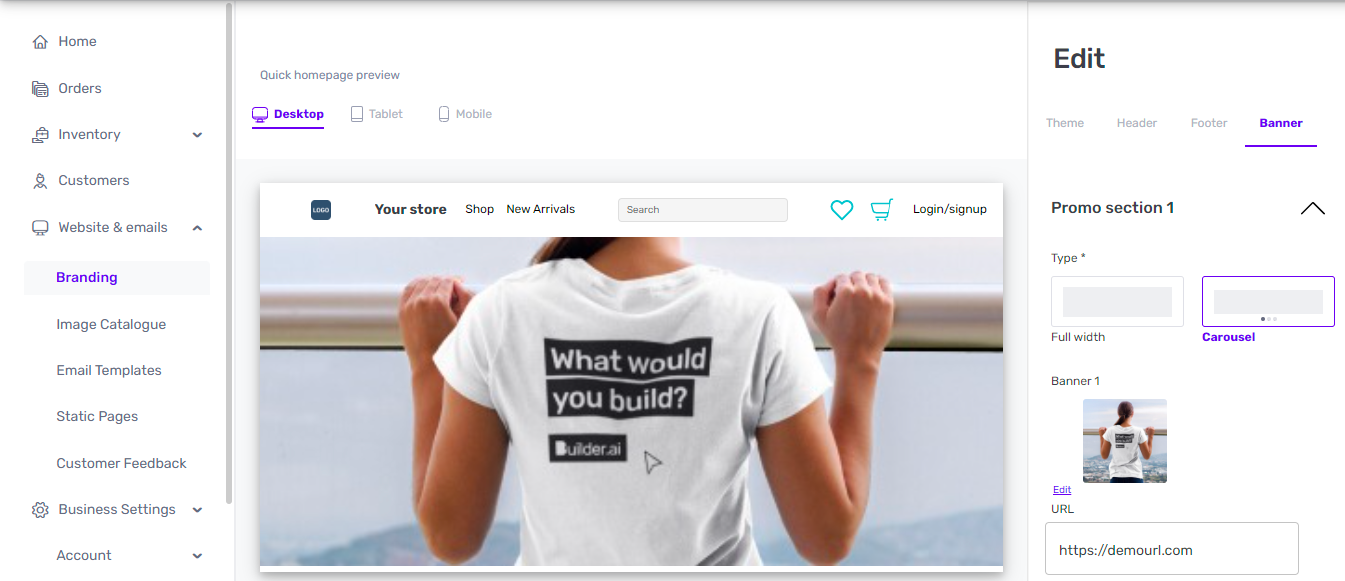
You can also use banners to highlight promotions and special offers to improve your conversion rates and preview how they look across various devices, including desktop, tablet and mobile.
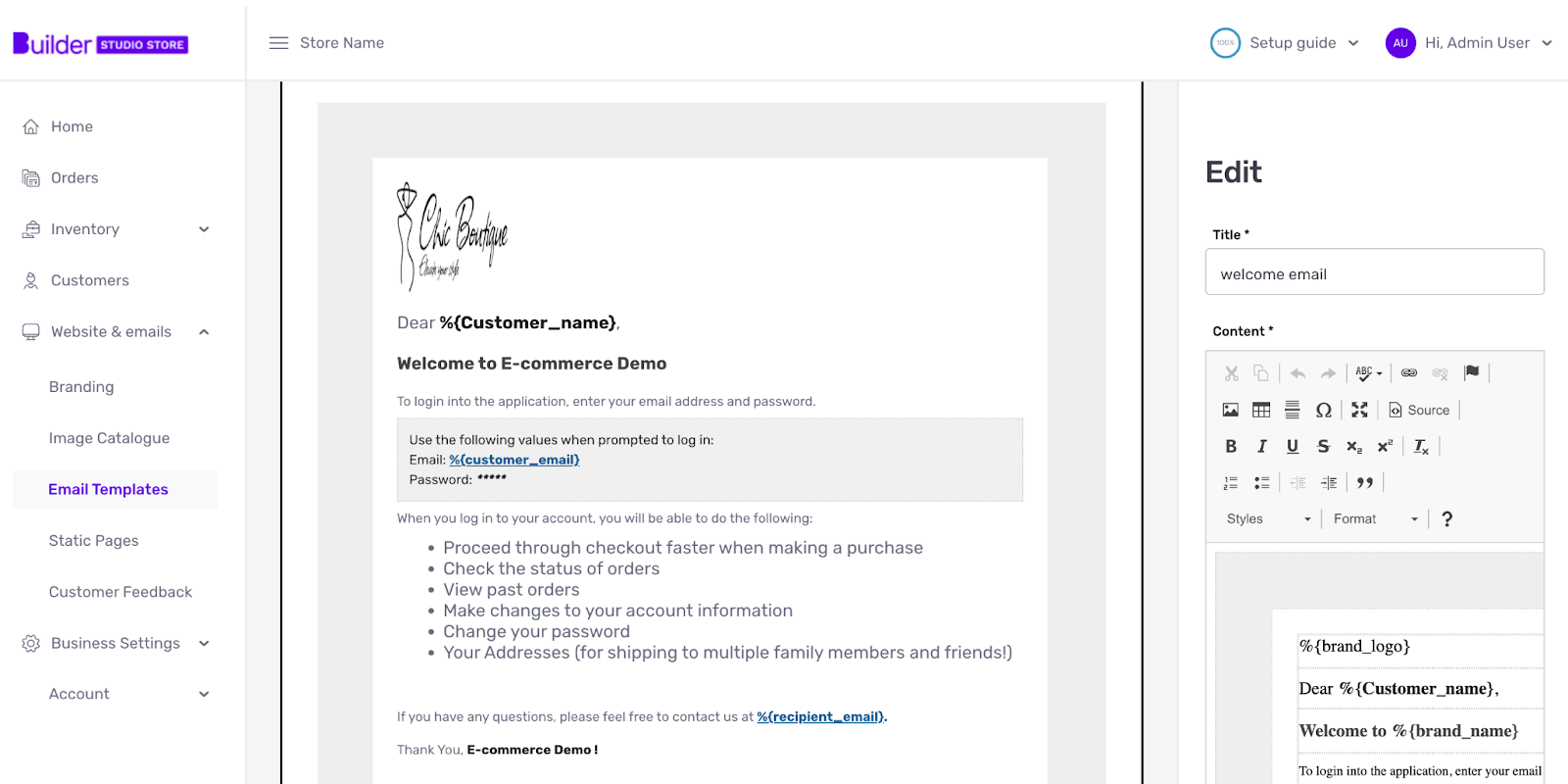
Additionally, within the email templates section, you can efficiently manage customer-facing and admin emails triggered by various actions, such as user sign-ups, one-time password (OTP) verification, order confirmations and payment notifications.
With Builder.ai’s Studio Store, basic email templates are pre-filled, but customisation options are available, allowing you to edit existing templates or create entirely new ones to tailor your communication with customers and users.
2 - Configuring business settings
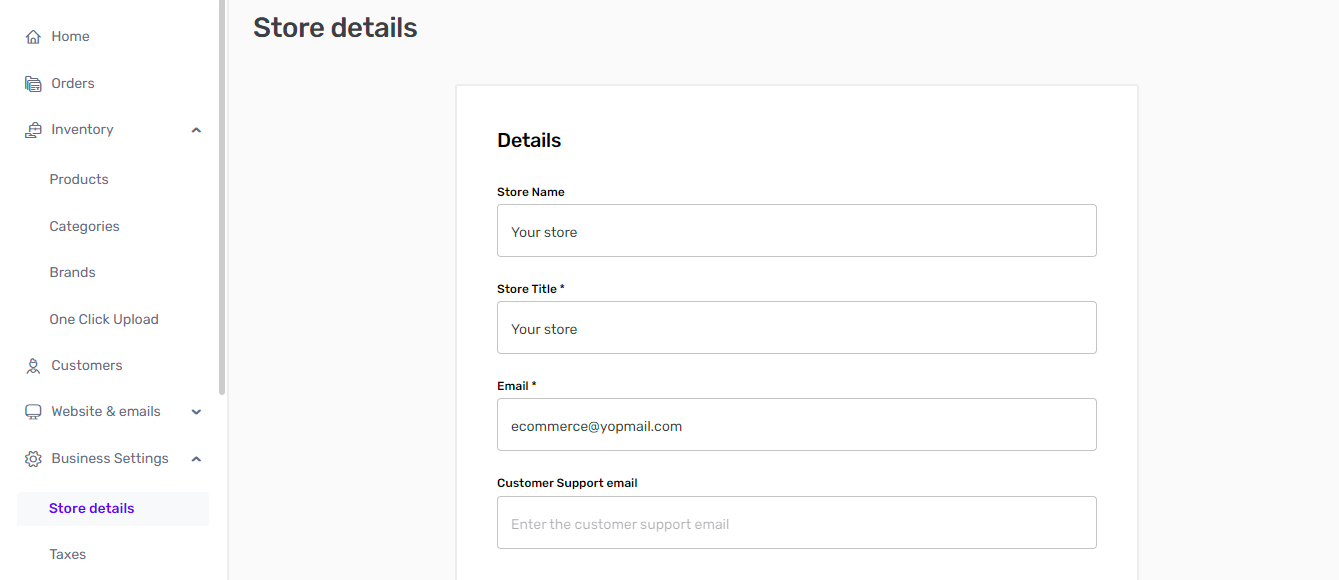
When setting up your ecommerce app, your next step is to fill out your “Store Details”.
Here, you want to enter the basic store information, including your store name, title, contact information (email, phone, WhatsApp), address and currency preferences.
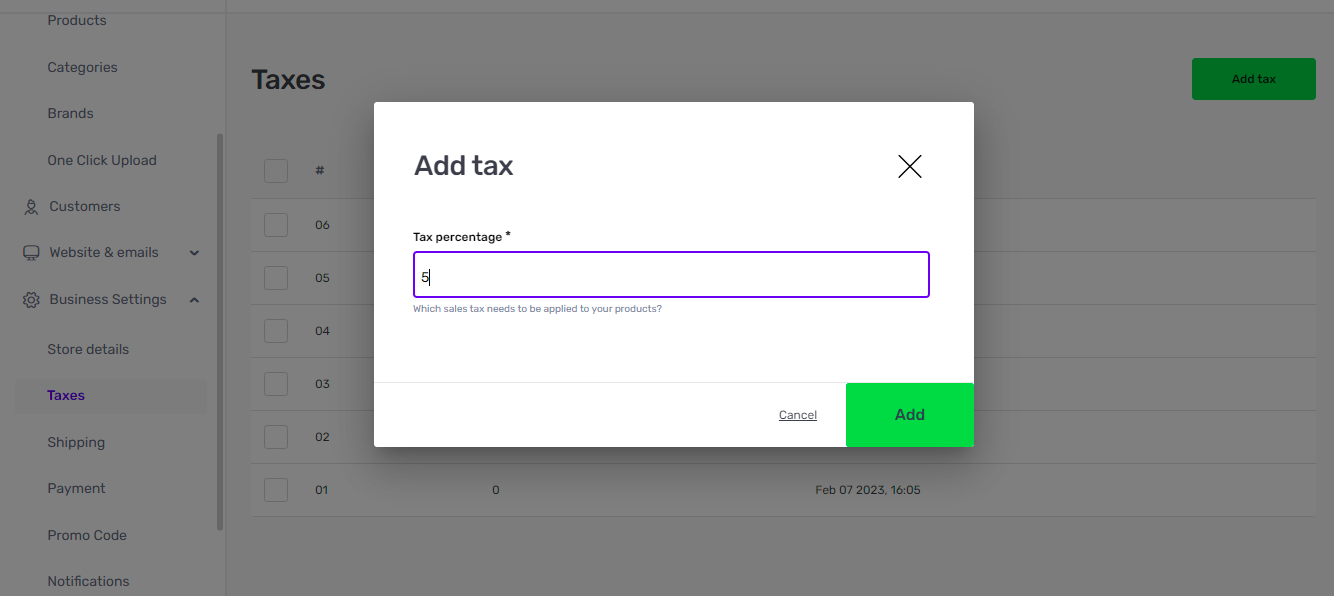
Managing taxes is equally important; within “Taxes”, you can establish the applicable sales tax rate for your products.
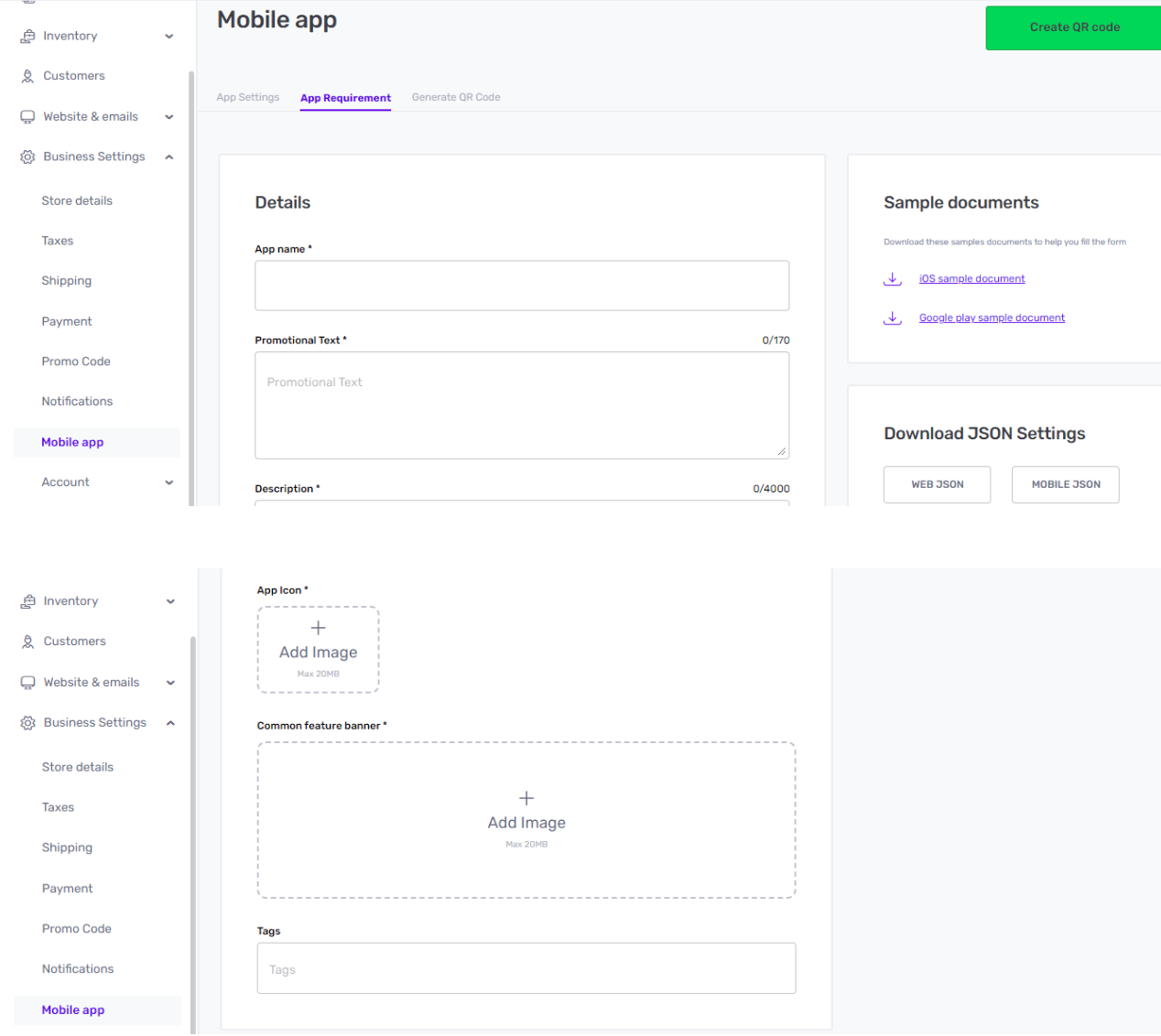
Additionally, when preparing to launch your mobile app, navigate to “App Settings” to select your primary app colour and then move on to “App Requirement”, where you provide the necessary details for app submission to both the Apple App Store and Google Play Store.
This includes general app information, contact details, page URLs, pricing, distribution details, app category and other relevant data. Remember to create accounts on Google Play Store and Apple Developer for app publication by following the provided guidelines.
3 - Setting and managing inventory
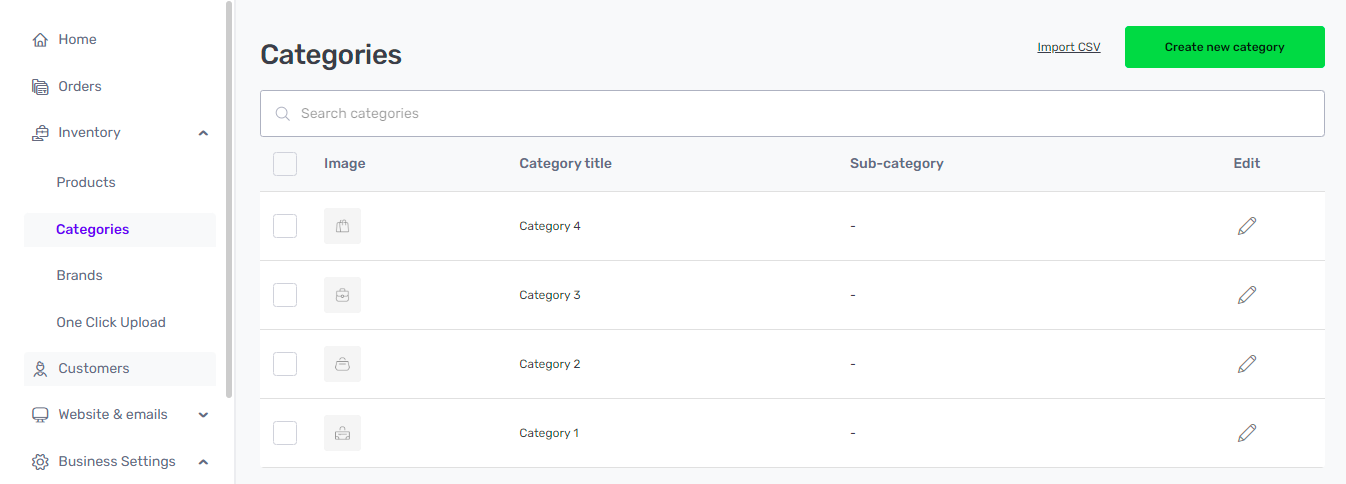
Managing your ecommerce app's inventory is a crucial aspect of running a successful ecommerce plan for your entire business. To streamline this process, you can create categories and subcategories under Inventory, helping you organise products efficiently.
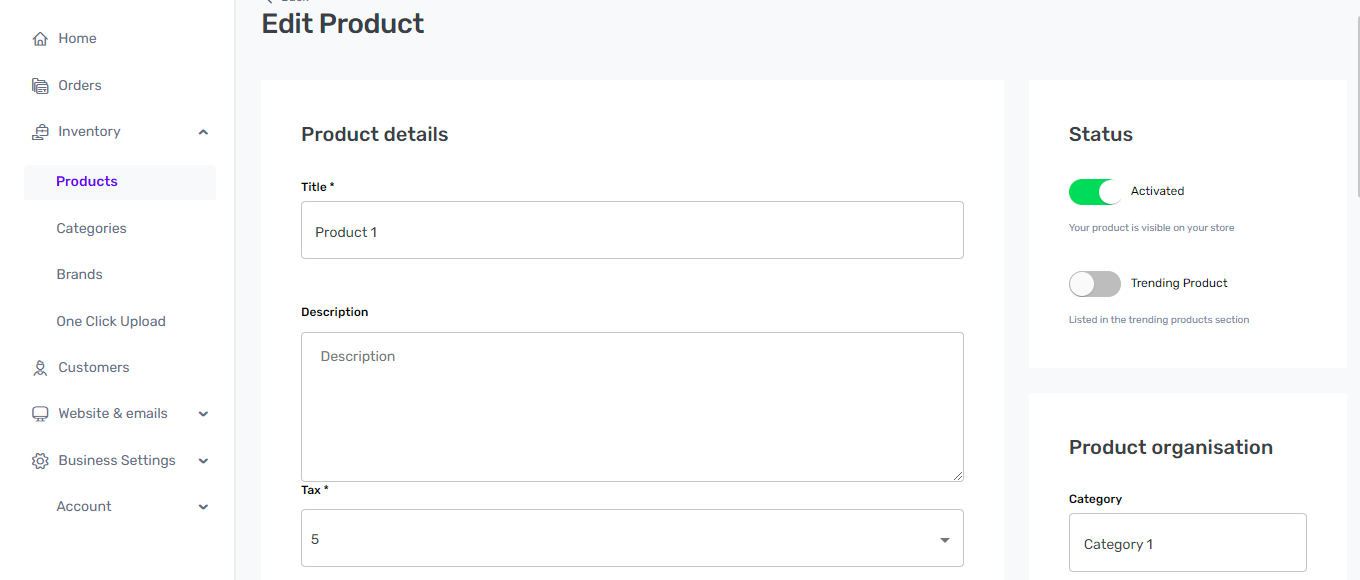
By assigning detailed product descriptions to specific categories and subcategories, such as "Electronics" and "Televisions," you make your store easy to navigate, enhancing the online shopping experience for your customers.
Moreover, you can upload multiple categories through CSV files, saving time and effort.
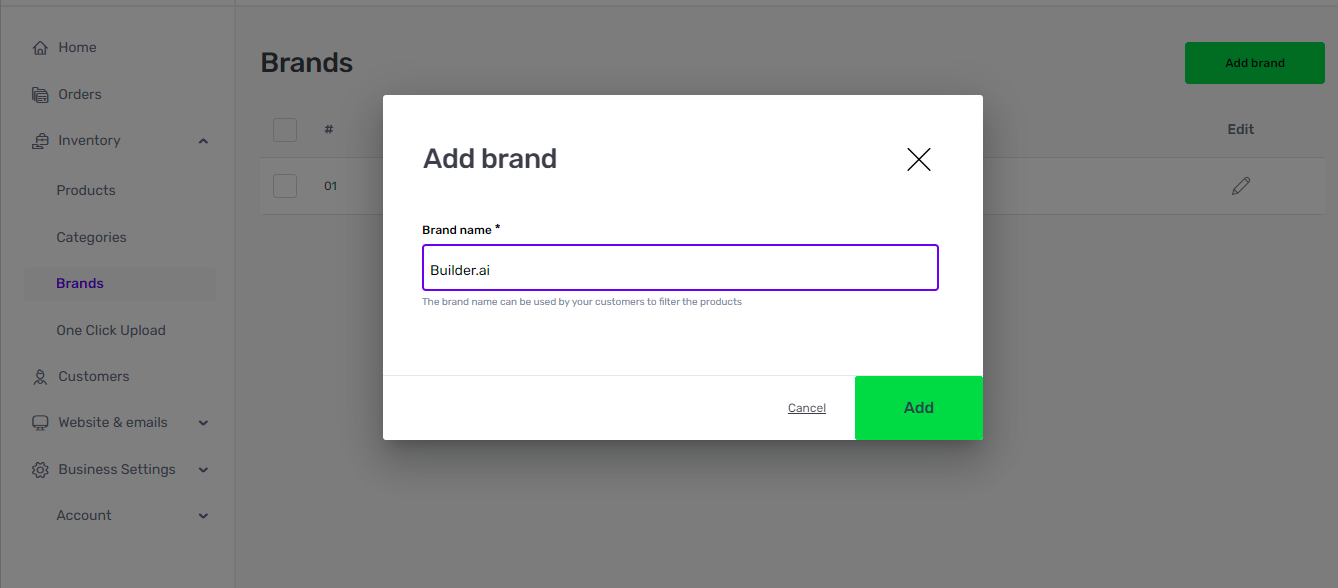
In the “Brands” section, meanwhile, you have the flexibility to add the various product brands your store offers. Whether you sell a range of brands or just your own, this feature allows you to further categorise your products and make it simple for customers to find what they’re looking for.
Furthermore, you can bulk upload product details, including variants like sizes and colours, streamlining the process of building your product catalogue.
4 - Set up payment methods and shipping costs
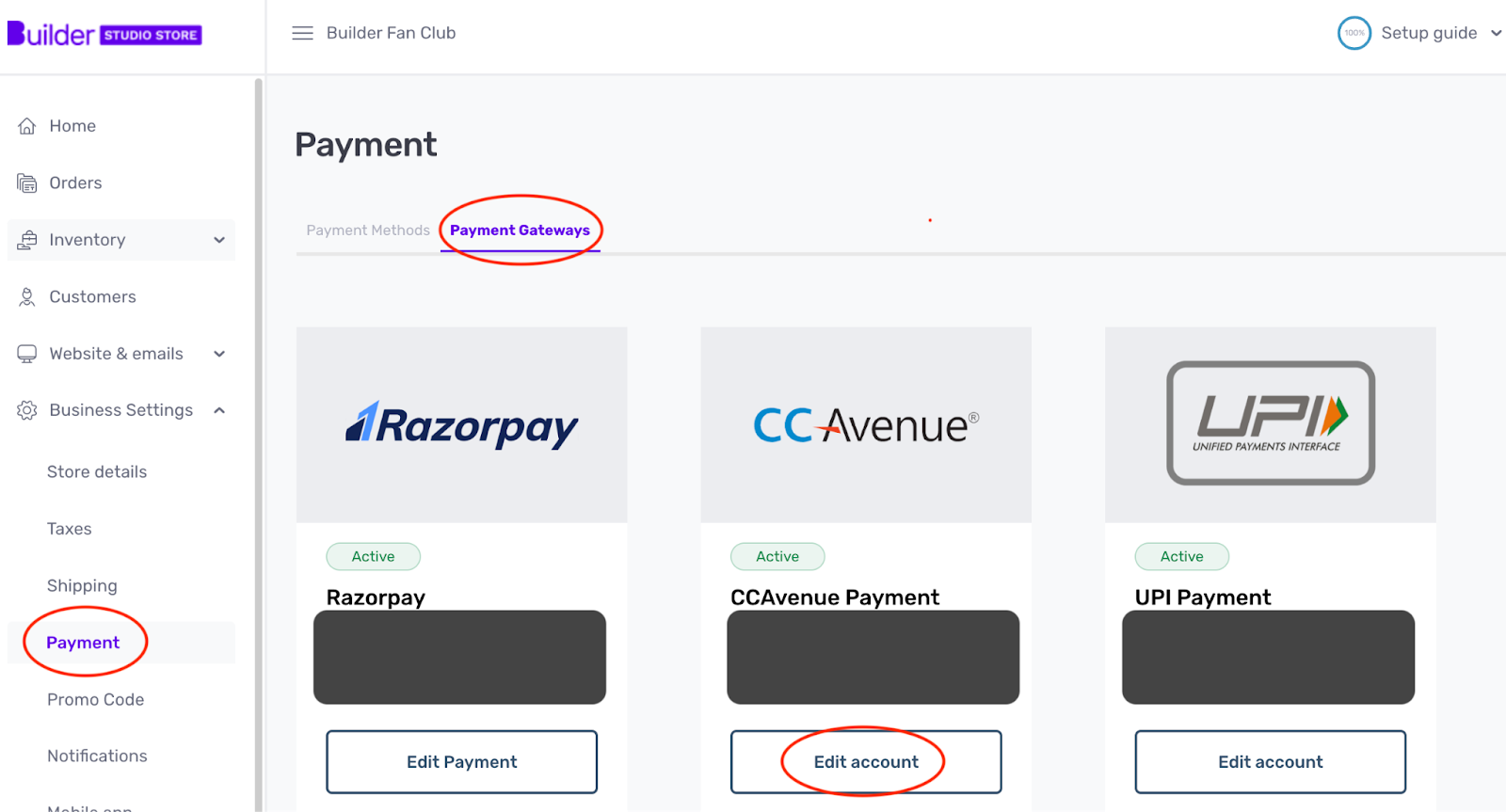
To create a seamless payment and checkout process, platforms like CCAvenue and Stripe offer seamless solutions. For CCAvenue, merchants need to create an account and obtain API keys and configure them in your store's settings.
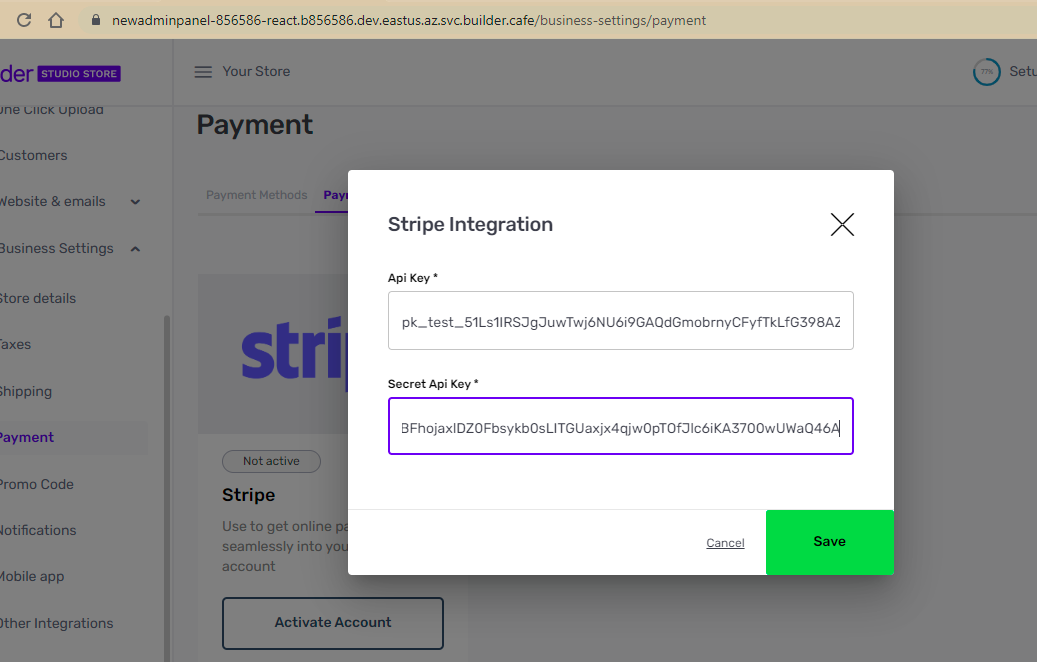
Similarly, Stripe integration involves registering an account, obtaining API keys and pasting them into your store’s settings to activate the Stripe account.
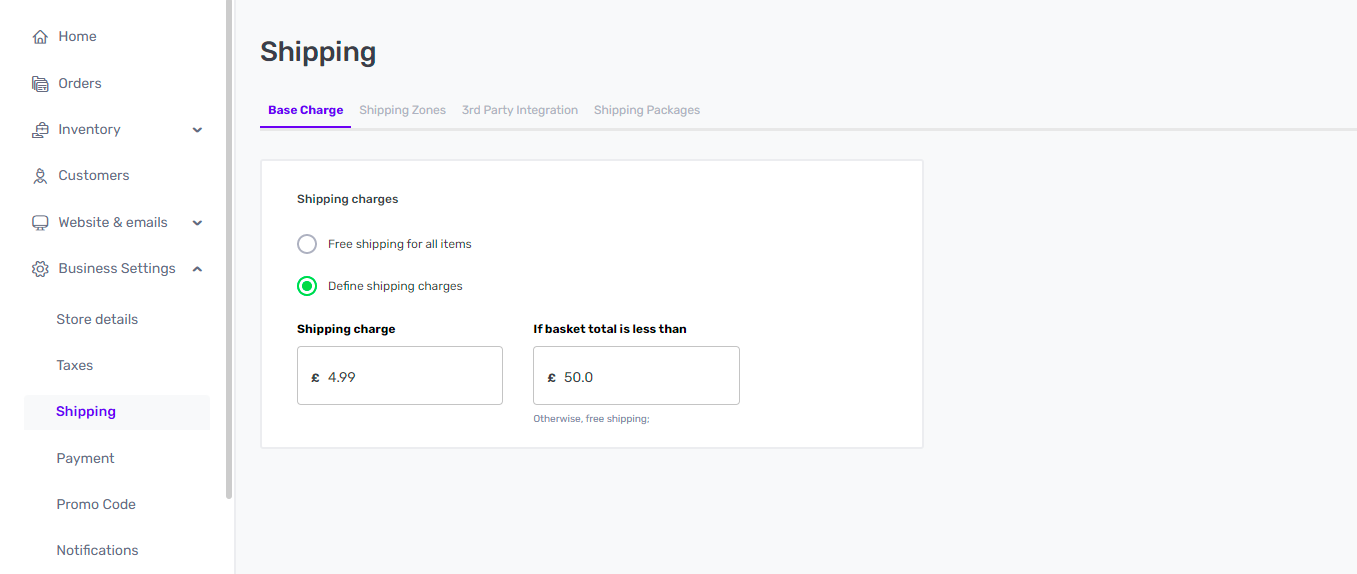
Now it's time to establish your shipping strategy.
Set up shipping options and shipping details in a way that your customers have complete clarity on their orders.
You can define shipping labels and set base charges based on order value, with an extra cost if you are a "made to order" brand.
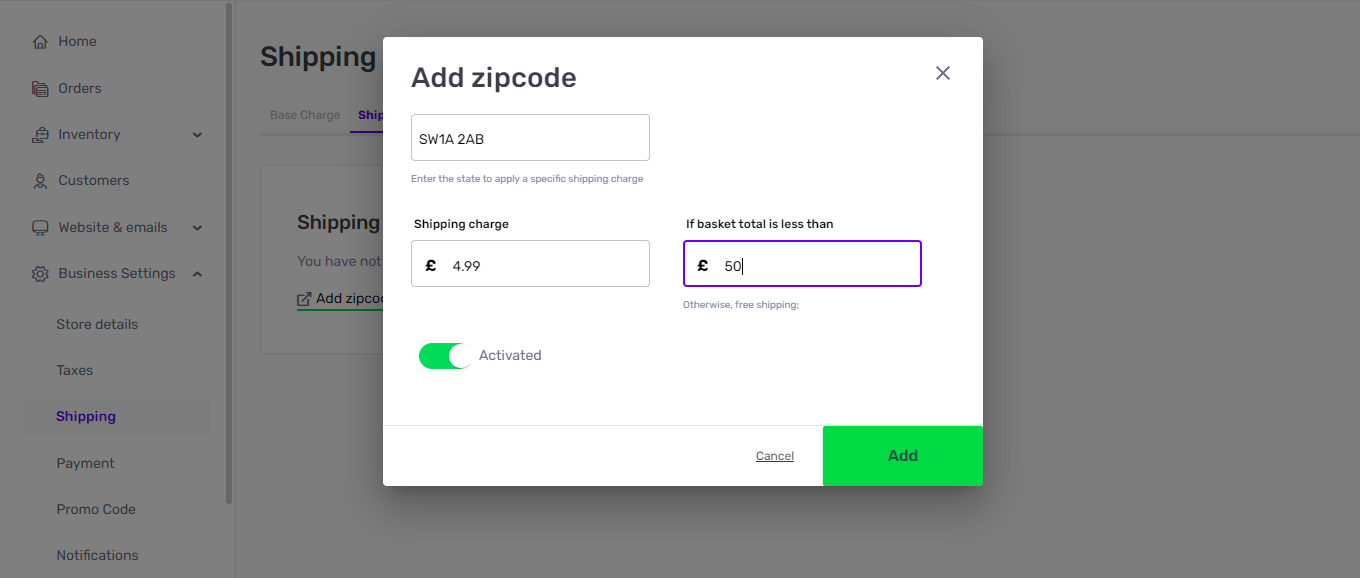
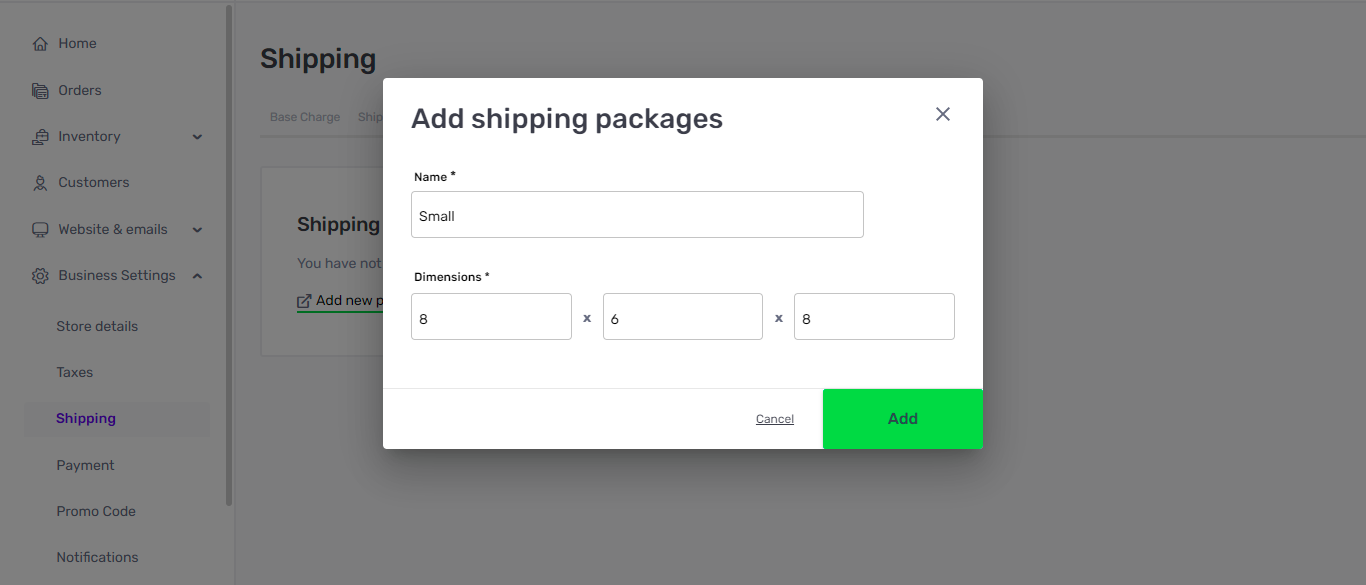
Shipping zones can be specified using zip codes, while you can also set up third-party integrations with logistics partners like Shiprocket and Stuart.
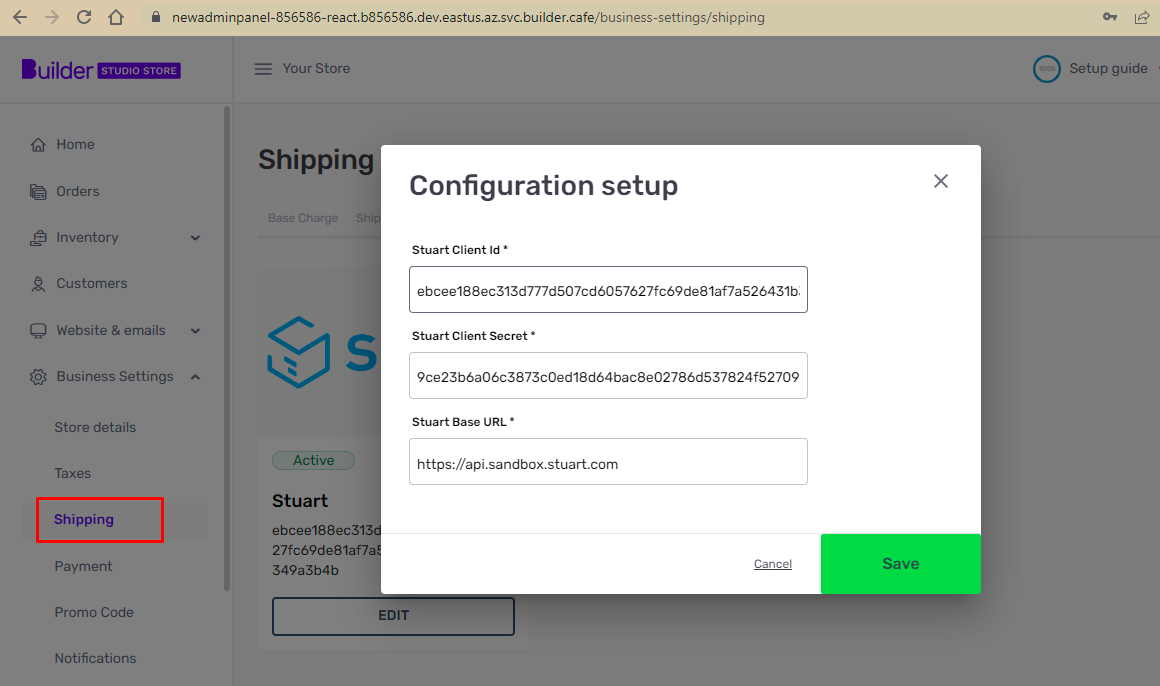
Once integrated, you can efficiently manage your payments and shipping settings.
5 - Manage orders easily
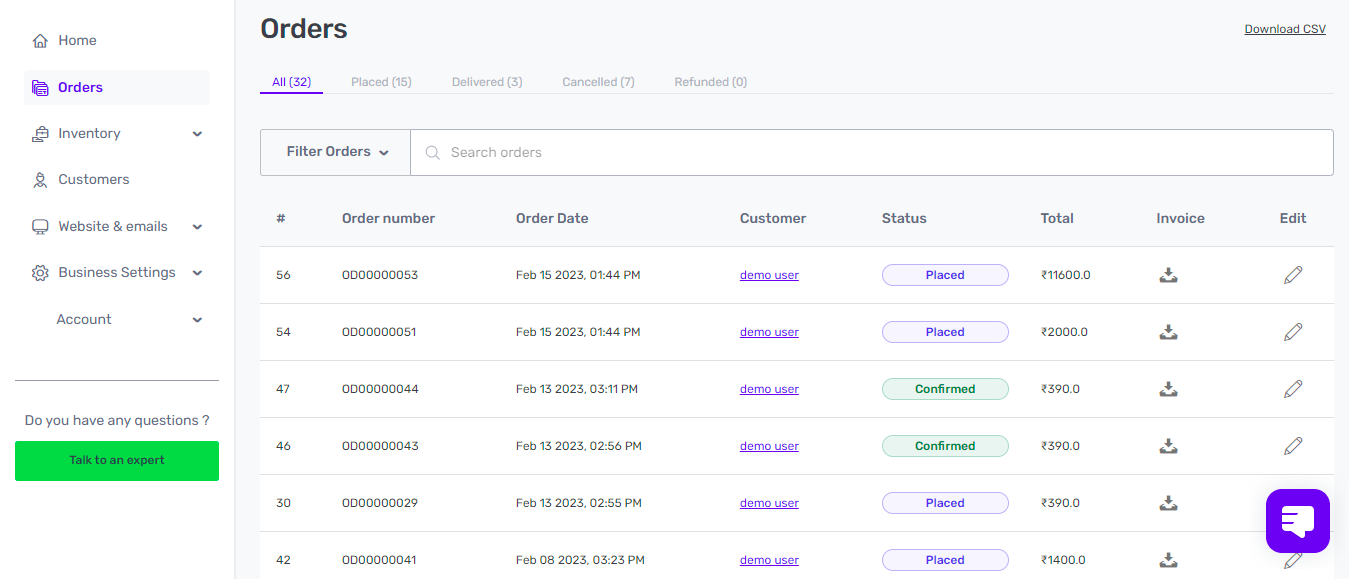
Now you're ready to launch and start accepting orders!
The “Orders” section serves as your command centre for managing orders efficiently. You can easily view, filter and process orders based on various criteria such as date range, order status and order amount.
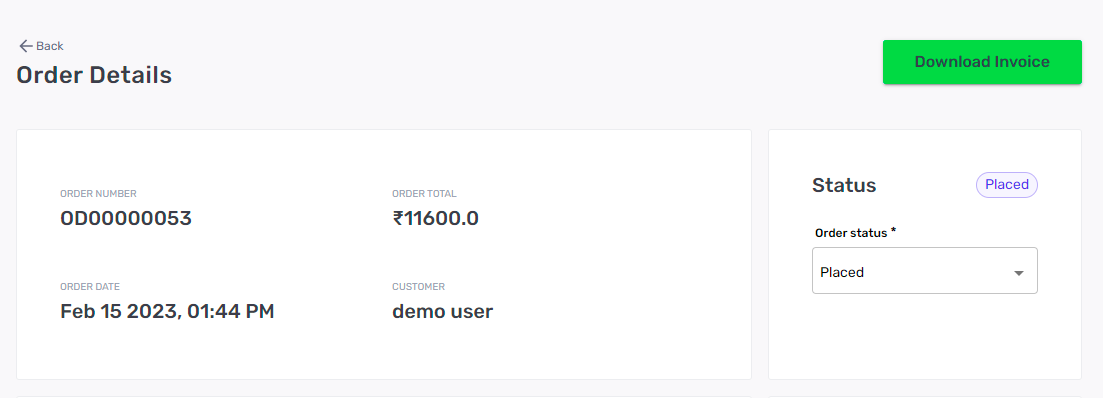
Quick access to order details includes transparency on:
- Item specifics and delivery addresses
- Manual shipping labels have options like Confirmed, In Transit, Delivered, Cancelled, Returned and Refunded
- Automatic invoice generation for each order
- Easy order detail downloads
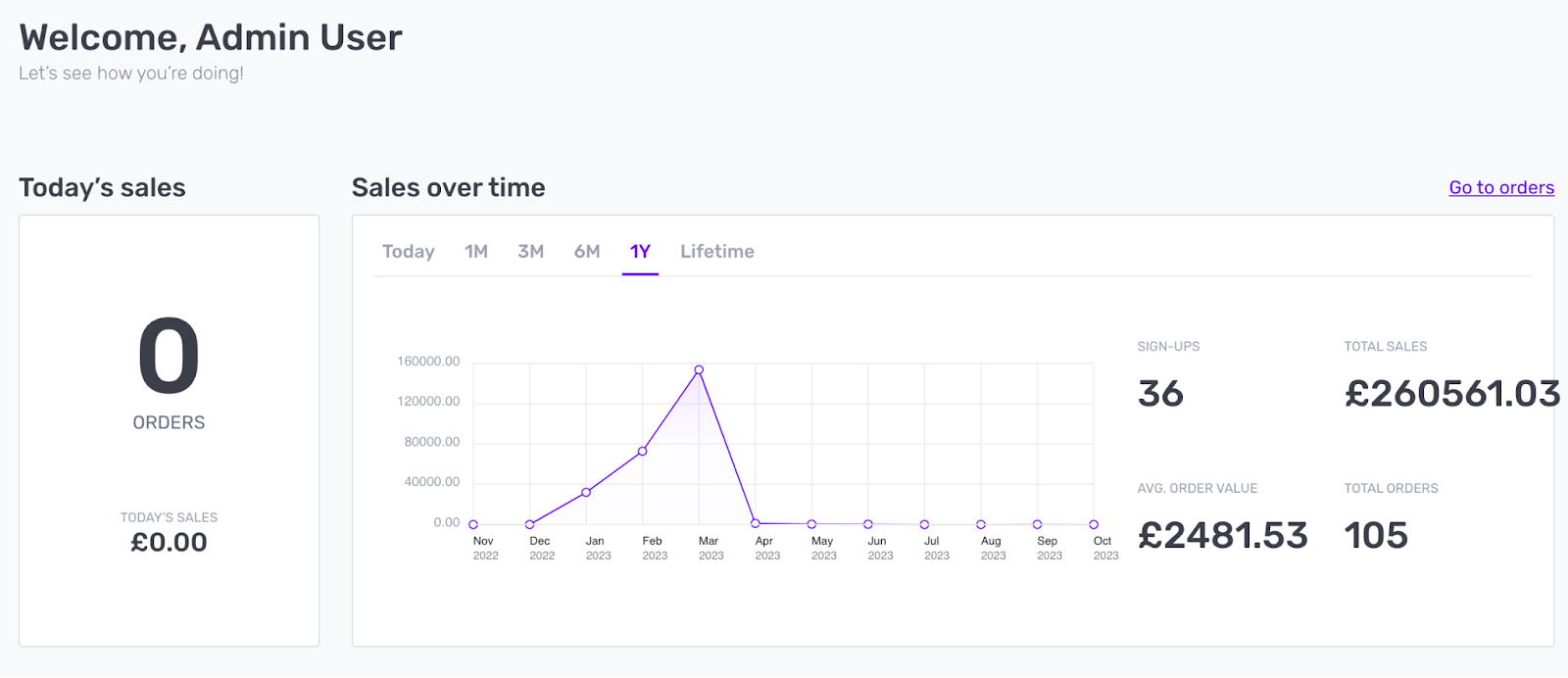
To keep a close eye on your store's performance, you need to head to your analytics dashboard. This provides valuable insights into sales trends over time, daily sales figures and downloadable order reports in CSV format, allowing you to monitor and analyse your entire business's growth.
Ecommerce app examples
Let’s now take a look at ecommerce apps built by Builder.ai 👇
Fashtechi
FashTechi is a social-first fashion ecommerce platform that gives fashion brands and boutique stores the tools to manage their catalogue listings as well as sell and ship their products, all from a single platform.
As smaller fashion companies spend years struggling to find their audience and figure out influencer marketing, Mohit Arora, founder of Fashtechi, wanted to change and disrupt the industry.
Using Builder.ai as tech partner, Mohit Arora built Fashtechi. The platform empowers sellers to grow faster by giving them access to a pool of influencers, which they can use to promote their products to a larger audience.
Siam Makro
Siam Makro is South Asia's largest cash & carry wholesaler. They supply quality products and services at an affordable price and are the go-to choice for food retailers, grocery stores, the hospitality industry and more.
Siam Makro’s legacy order management system (OMS) was complicated and made the onboarding process extremely resource intensive.
Builder.ai successfully replaced Siam Makro’s legacy OMS with a cost-effective, reliable solution running on AWS.
Kitchenfirst
Kitchenfirst is an online grocery app. Hemant Keshari, the founder, wanted to take his local business of selling groceries and kitchen items online.
Hemant says: “Because of Covid, I lost a lot of customers and needed a way to reach customers online to keep sales up”
Builder.ai’s Studio Store offered Hermant all the features he needed to bring his business online fast, helping him expand his customer base and keep more profits (because there’s no revenue share).
Conclusion
Just like that, you can build an ecommerce app from scratch. With a builder platform like Builder.ai, you don’t even need to have any prior experience or a deep technical understanding. As long as you have a viable idea, we can help.
To find out more about building an ecommerce app with Builder.ai, please contact us. Alternatively, start building your ecommerce today.
FAQs
Can you create an ecommerce app without coding?
Yes, you can create an ecommerce app without coding. You will need to use an app builder like builder.ai which offers a no-code option, perfect for novices and those with little to no technical understanding.
How much does it cost to build an ecommerce app?
The price of creating an ecommerce app varies depending on the features you want to include. The more features you add – such as abandoned trolley reminders – the more it will cost you. App design also plays a role. Generally, it is cheaper to use an app builder.
How long does it take to build an ecommerce app?
The timeframe to create an ecommerce app varies depending on the time you have available to dedicate to the project and the app development route you choose. When you use an app builder, you can build a launch-ready app in less than two weeks, but this doesn’t include the marketing strategy or competitor research. All told, the ecommerce app development process takes between six and nine months from conception to completion.
Can I create an ecommerce app for free?
With Builder.ai you can create a free prototype for your project. Plus, our Studio Store ecommerce app lets you take up to 50 orders every month for free. It's a 'Shop in a Box' as you get iOS and Android ecommerce apps, a new website, as well as app maintenance and we'll even host it for free for you too. When your business scales, you can upgrade to unlimited orders for a really cost effective price. So there's no risk at all.
Ananth Ramanathan runs Studio Store business at Builder.ai with a mission of digitising a 1M+ micro SMEs in the next 5 years. He oversees the commercial, product, and customer success functions to rapidly scale Studio Store globally. Ananth's an experienced tech business operator, a failed entrepreneur, and an active angel investor.

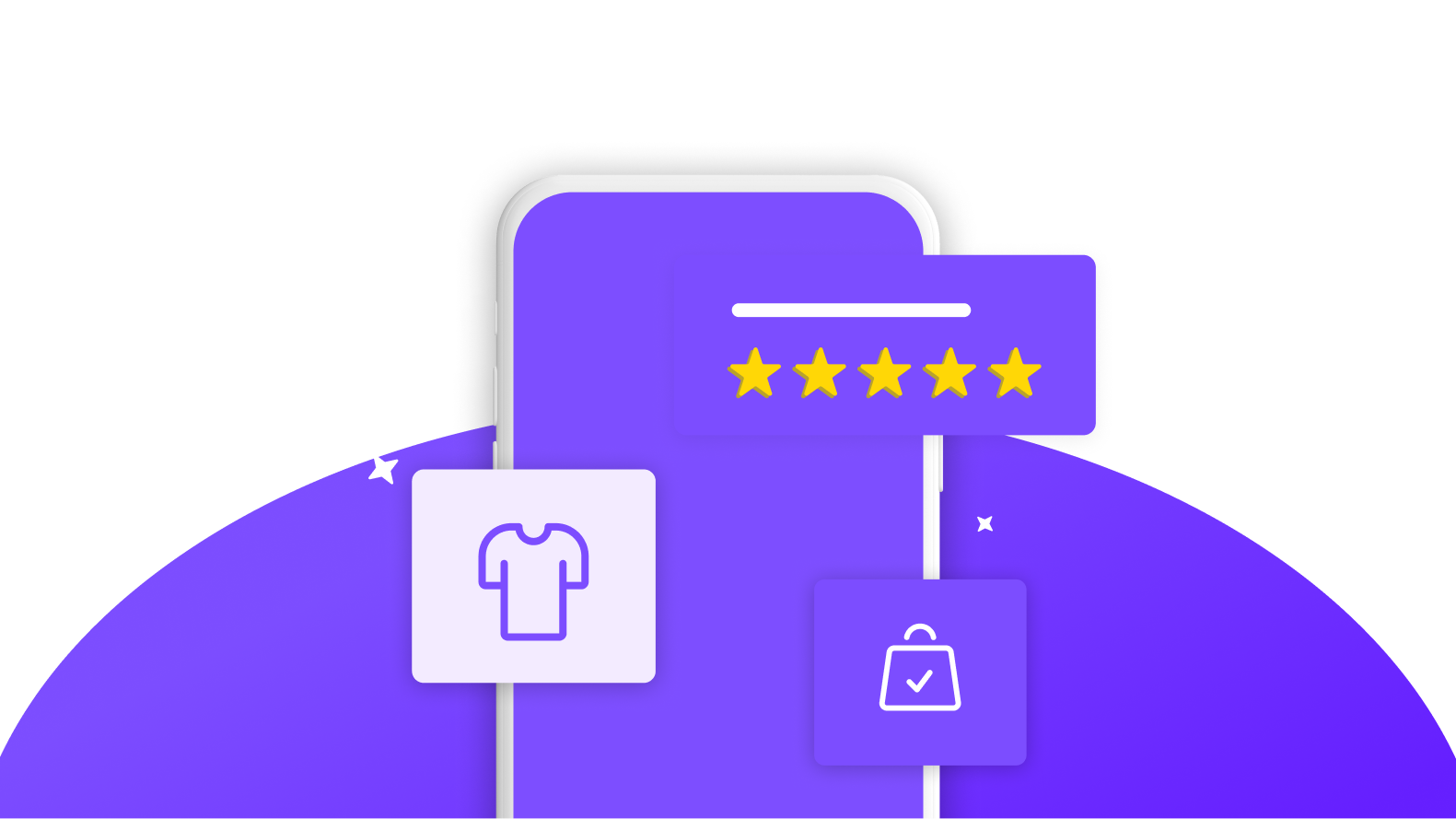

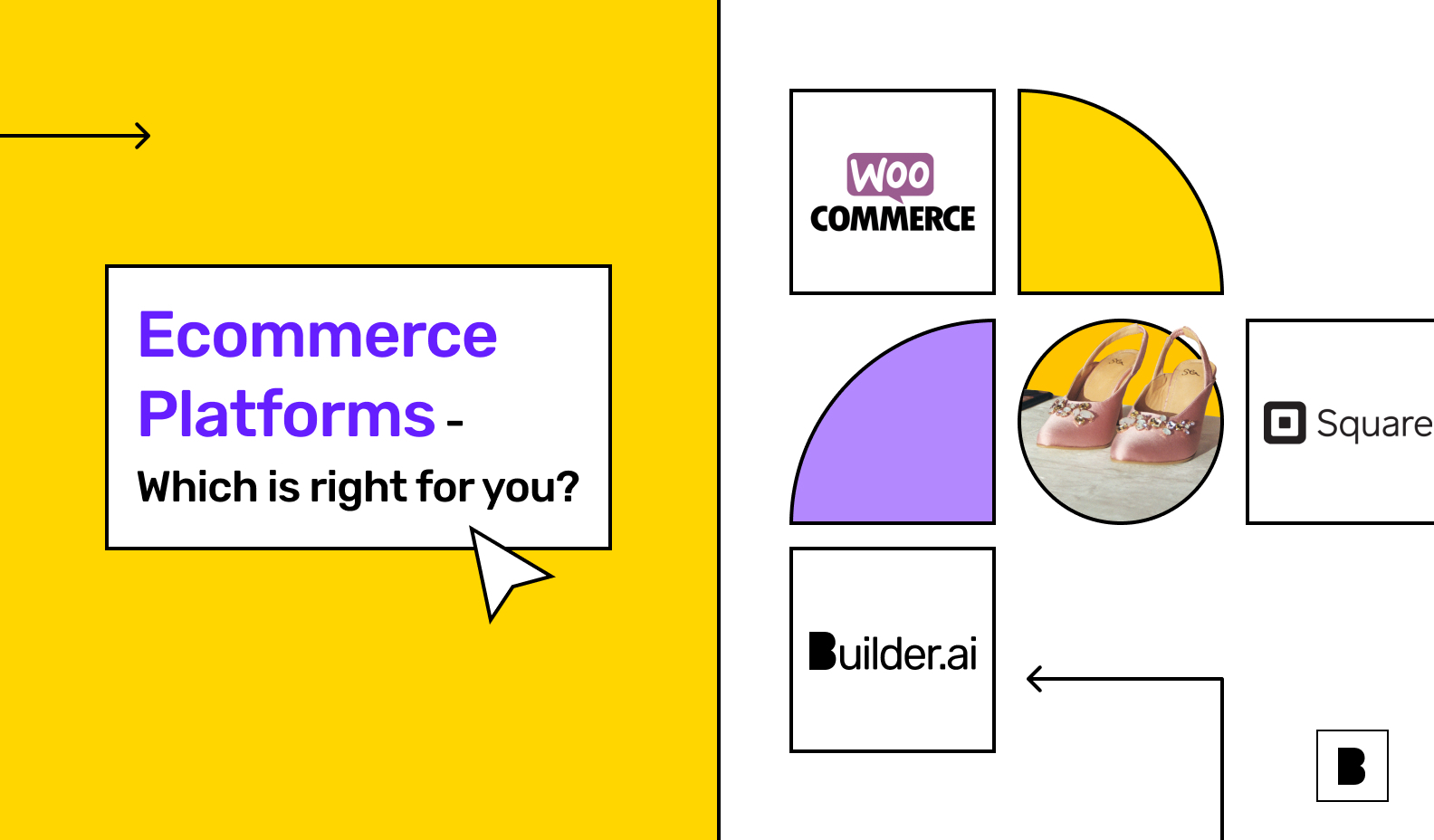
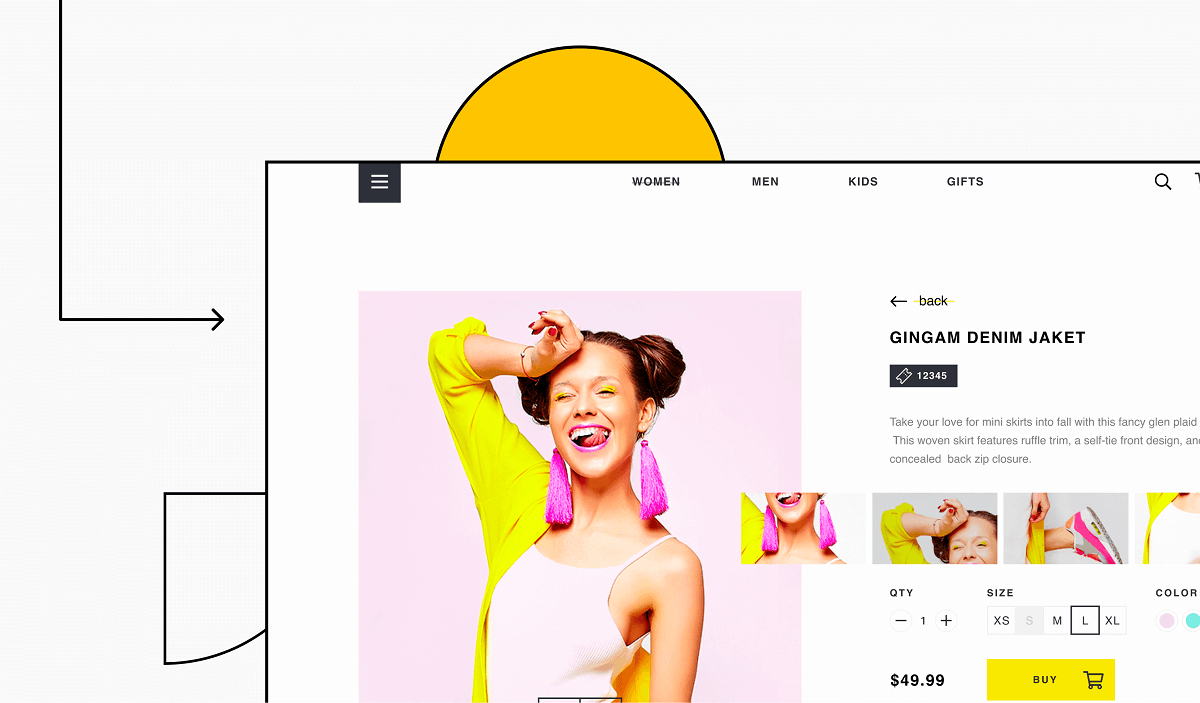
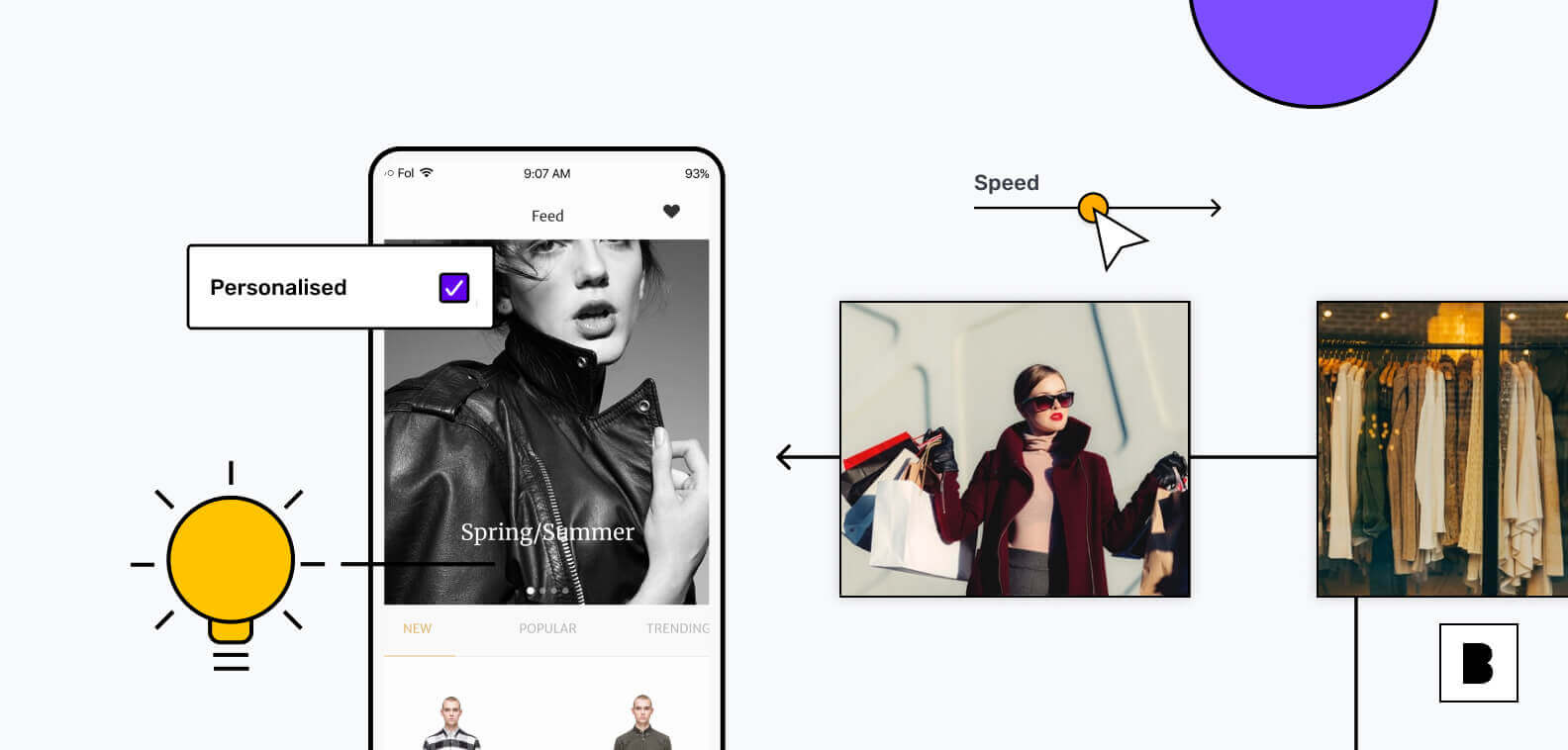






 Facebook
Facebook X
X LinkedIn
LinkedIn YouTube
YouTube Instagram
Instagram RSS
RSS


